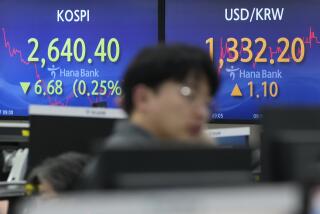CURRENCY : Dollar Declines Sharply Against the Yen and Mark
- Share via
NEW YORK — The dollar slumped to near-record lows against the Japanese yen and West German mark Friday amid continued skepticism about the ability of the U.S. budget deficit accord to hold together.
The lower dollar sent the British pound soaring to its highest level in 5 1/2 years, while gold prices were up nearly $10 an ounce at $486 for the leading December contract.
“The gloom is thickening,” said Bob Hatcher of Barclays Bank. “New historic lows (for the dollar) are a probability.”
The dollar closed at 1.6510 West German marks, down nearly 2 pfennigs from 1.6680 marks at Thursday’s close in London when the U.S. markets were closed for Thanksgiving. The dollar is now just above its all-time record low of 1.6475 marks, hit early this month, since the current mark was created in 1948.
The dollar also closed at 133.50 Japanese yen, down from 134.55 yen on Thursday in London and near the all-time floor of 133.13 yen, also hit early this month. In New York, it slipped to 133.55 yen.
James McGroarty, chief dealer at Discount Corp., said the dollar came under pressure in overseas markets Thursday night and Friday morning. Europeans and, in particular, the Japanese remained skeptical about passage of the budget pact hammered out by the White House and Congress a week ago, he said.
Pessimism Widespread
Dealers expect that talks that begin next week in Congress over passage of the deficit pact will be drawn out and boisterous. Some predicted final approval, assuming it occurs, will not come until just before Congress adjourns for its Christmas recess.
“For the moment it really appears there is general pessimism emanating from Europe and Japan. They are not sure whether the budget pact will be passed and, until it is, there will be no G-7 meeting,” McGroarty said.
Traders have been awaiting a possible meeting of the powerful Group of Seven industrialized nations, which would likely formulate a new agreement designed to calm the volatile foreign exchange markets.
The dollar’s headlong decline has come despite moves toward lower interest rates earlier this week by several European countries, including West Germany and France, which would normally make the dollar a more attractive investment.
The British pound closed at $1.8135, up nearly 2 cents from $1.7940 on Thursday in London and its highest close since February, 1982. Traders said the pound was buoyed by a statement from Britain’s finance minister, Nigel Lawson, who said he saw no immediate drop in British interest rates. Later in New York, the pound maintained its strength, fetching $1.8105.
Other late dollar rates in New York, compared with late Wednesday, included: 1.6540 West German marks, down from 1.6705; 1.3540 Swiss francs, down from 1.3718; 1.30875 Canadian dollars, down from 1.3098; 5.6225 French francs, down from 5.6665, and 1,222.75 Italian lire, down from 1,227.50.
Gold prices ended at their highest closing levels since mid-October after a lower dollar and signs of higher inflation sparked a rally, traders said.
The leading December gold contract closed up a strong $9.20 higher at $486.10 an ounce. In New York, Republic National Bank quoted gold bullion at a bid price of $486.00 an ounce, up from $476.20 late Wednesday.
More to Read
Inside the business of entertainment
The Wide Shot brings you news, analysis and insights on everything from streaming wars to production — and what it all means for the future.
You may occasionally receive promotional content from the Los Angeles Times.










